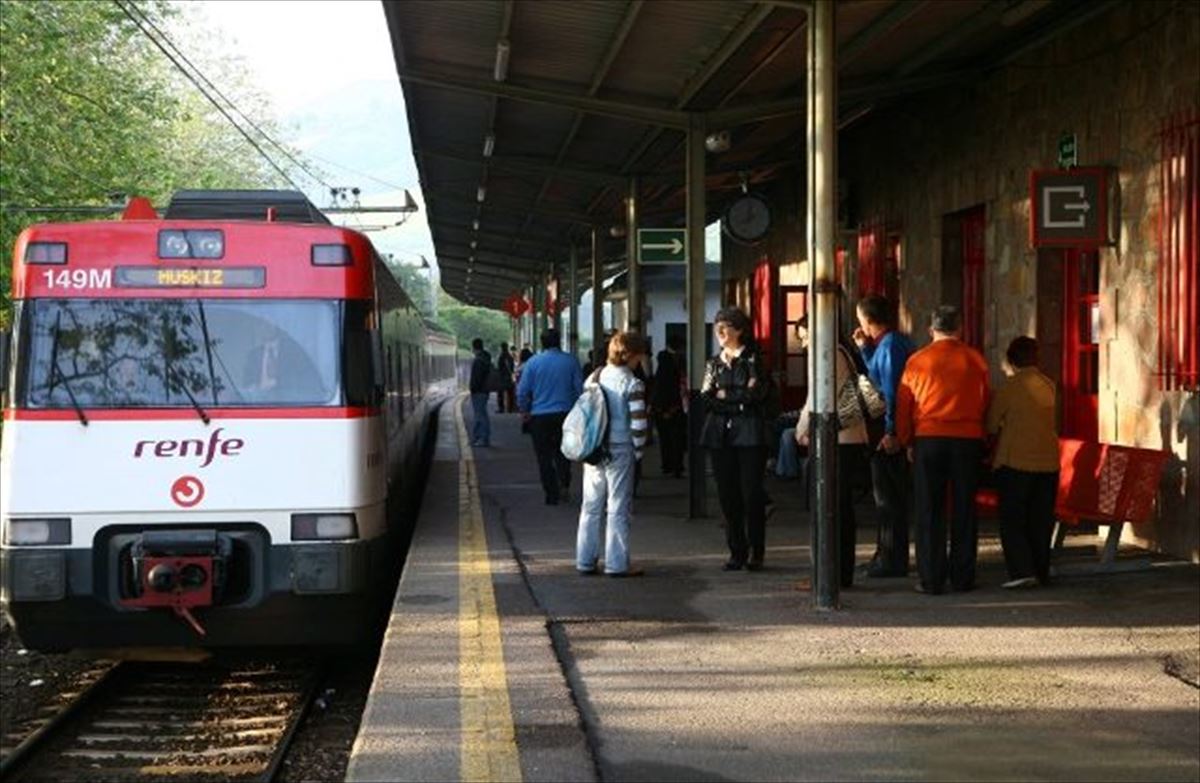These are the Renfe commuter railways, the management of the homologation and equivalence of foreign university degrees and studies, and the reception system for beneficiaries of international protection in their autonomy phase.
The plenary session of the Joint State-Euskady Transfer Commission, which met today in Vitoria-Gasteiz, approved the transfer to the Autonomous Community of powers over the Renfe suburban railways, the management of the homologation and equivalence of degrees and university studies of foreigners , and the reception system for beneficiaries of international protection in their autonomy phase, the Basque government reports in a note.
However, the Euskadi board is of the opinion that ‘this is still the case a significant number of transfers in progress to complete what is established in the Statute of Gernika”.
For his part, the delegate of the Spanish Government in Euskadi, Denis Itxaso, believes that this transfer “takes the step towards a federal country that relies on decentralization and co-governance as essential tools for better delivery of public services.” Itxaso has expressed his “pride” in having belonged to an executive “that understands co-governance with the CCAA from “sensitivity and commitment.”
The PNV candidate for lehendakari, Imanol Pradales, has stated that “today is an important day” but has called for “continuing to take steps to improve self-government, because this means improving the well-being of Basque society.” Pradales has congratulated itself on these transfers, which came about ‘thanks to the drive and persistence of the PNV’, while calling for ‘tackling the next phase of negotiations in the coming months’ in order to ‘make progress in terms of quality of life’. .” He specifically referred to the management of ports and airports.
The Joint Commission is the body within which the two administrations agree on the transfer of the personal and material resources necessary for the performance of the transferred functions and services.
Once the transfers are approved by the Joint Transfer Commission, the next step is approval by the government council of the decrees corresponding. The Spanish government must also approve the relevant measures royal decrees in the Council of Ministers.
Environment
The transfer of commuter trains means that Euskadi will take the lead commuter train services existing in Bizkaia and Gipuzkoa. The functions of the Autonomous Community of the Basque Country include the regulation, planning, management, coordination and inspection of the transferred services, as well as tariff authority over them, timetables and frequencies.
The transfer focuses on the Bizkaia shuttle services: Bilbao Abando-Barakaldo-Santurtzi; Bilbao Abando-Barakaldo-Muskiz; Bilbao Abando-Laudio-Orduña; and Bilbao-Balmaseda. In Gipuzkoa the shuttle service is transferred: Irun-Donostia-Tolosa-Brinkola.
In addition, Euskadi will have the possibility to indicate new shuttle services in Álava in between Araia and Vitoria-Gasteiz and between the capital Álava and Ribera Baja apple trees. The establishment of shuttle services in Álava would take place on the current railway line. You can also report it as a new shuttle service between Bilbao and Carranza Valley.
On the other hand, the agreement mentions the transfer of access lines to the Port of Bilbao which will be replaced in the future by the Southern Railway Bypass (currently in the planning stages). The transfer will take effect once the Bilbao Southern Railway Bypass is completed and put into service. At that time, the following lines will be delivered and operated: Bilbao Abando-Santurtzi; Desertu Barakaldo-Muskiz; and Bilbao Mercancias-Santurtzi.
The economic valuation of the transfer has been carried out using the Economic Agreement methodology, in such a way that the amount to be deducted from the quota would amount to 92.7 million of euros.
The agreement also includes the launch of a infrastructure investment plan of ADIF to address the shortcomings and improve the condition of some infrastructures that affect the provision of shuttle services. About 100 actions are estimated with a value of around 400 million euros.

Homologation of diplomas obtained abroad
The CAV also assumes these tasks with regard to requests for homologation or declaration of equivalence of higher education degrees obtained abroad by people registered in a municipality in the Basque Country. The recognition assumes that they will have the same effects as state titles, allowing them to practice the qualified profession in question. For example medicine, architecture or law.
Euskadi will be the only autonomous community to manage these functions. The Ministry of Education of the Basque Government will be responsible for the recognition of homologation and equivalence.
Given the current demand for certain professionals and qualified workers with a university degree, this transfer may serve to address these needs to applicants for homologation or declaration of equivalence, as explained by the Executive of Euskadi. The transfer will be effective from July 1 this year and will be financed from the associated rates.

Transfer of immigration functions and services
Finally, the Basque and Spanish governments have approved the transfer of social assistance functions and services in the autonomy phase to people who have recognized the status of beneficiaries of international protection and who have requested inclusion in that system. With this transfer, the autonomous community takes over responsibility management of the reception process of these people, who are guided in the consolidation of knowledge and skills that will make effective their full inclusion in the society that welcomes them.
The autonomy phase of people who have been granted access to international protection status lasts a maximum of six months. In this way, during this period they receive support in gaining access to training for work, they are guided in their search for housing and they are provided with integration activities. In short, these people are helped to carry out a full trajectory of inclusion and integration into society, managed by the institutions of the CAPV. “This transfer will mean an intensification of social assistance programs and a boost to integration,” the Basque government emphasizes.
The economic valuation has been carried out using the Economic Agreement methodology, in such a way that the amount to be deducted from the quota amounts to 2.4 million of euros, and the transfer will be effective from January 1, 2025.
Source: EITB
I am Ida Scott, a journalist and content author with a passion for uncovering the truth. I have been writing professionally for Today Times Live since 2020 and specialize in political news. My career began when I was just 17; I had already developed a knack for research and an eye for detail which made me stand out from my peers.



